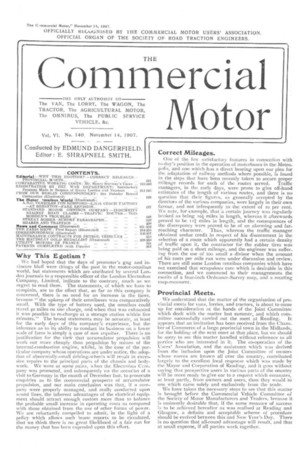Why This Egotism?
Page 1

If you've noticed an error in this article please click here to report it so we can fix it.
We had hoped that the days of promoter's gag and insincere bluff were things of the past in the motor-omnibus world, but statements which are attributed by several London journals to a responsible officer of the London Electrobus COmpany, Limited, indicate to the contrary, much as we regret to read them. The statements, of which we have to complain, are to the effect that, so far as this company is concerned, there is no need for an increase in the fares, because "the upkeep of their omnibuses was comparatively small. With the type of battery used, the omnibus could travel 40 miles on one charge, and when that was exhausted it was possible to re-charge at a storage station within five minutes." The broad statements may be accurate, at least for the early days of this company's experience, but the inference as to its ability to conduct its business on a lower scale of fares is simply a case of t1011 sepitur. There is no justification for the vieW that accumulator propulsion will work out more cheaply than propulsion by means of the internal-combustion engine, whilst, in the case of the particular company whose operations are under notice, the adoption of abnormally-small driving-wheels will result in excessive repairs to the principal parts of the chassis and bodywork. We were at. some pains, when the Electrobus Com_ pany was promoted, and subsequently on the occasion of a visit to Germany in the month of December last, to prosecute enquiries as to the commercial prospects of accumulator propulsion, and our main conclusion was that, if a company were properly managed, and really conducted upon sound lines, the inherent advantages of the electrical equipment should attract enough custom more than to balance the probable small increase in operating costs as compared with those obtained from the use of other forms of power. We are reluctantly compelled to admit, in the light of a policy which allows such inane reports to be circulated, that we think there is no great likelihood of a fair run for the money that has been expended upon this effort.
Correct Mileages.
One of the few satisfactory features in connection with to-day's position in the operation of motorbuses in the Metropolis, and one which has a direct bearing upon our plea for the adaptation of railway methods where possible, is found in the steps that have been recently taken to secure proper
mileage records for each of the routes served. Traffic managers, in the early days, were prone to give off-hand estimates of the length of various routes, and there is no question that their figures, as generally accepted by the directors of the various companies, were largely in their own favour, and not infrequently to the; extent of to per cent. We note, for example, that a certain journey was regularly booked as being io miles in length, whereas it afterwards proved to be si miles in length, and the consequences of the discrepancy were proved to be of an alarming and far
reaching character. Thus, whereas the traffic manager obtained undue credit in respect of his discernment in the selection of a route which apparently had a certain density of traffic upon it, the contractor for the rubber tires was being paid on a short mileage, and the engineer was suffering from the use of too small a divisor when the amount of his costs per mile run were under discussion and review. There are still some London omnibus companies which have not exercised that scrupulous care which is desirable in this connection, and we commend to their managements the merits of a four-inch Ordnance-Survey map, and a rotating map-measurer.
Provincial Meets.
We understand that the matter of the organisation of provincial meets for vans, lorries, and tractors, is about to come up for consideration at the hands of the Joint committee which dealt with the matter last summer, and which com
mittee successfully carried out the meet at Reading. It appears that an invitation has been received from the Chamber of Commerce of a large provincial town in the Midlands, for the holding of the next meet at that place, but we should be sorry to see this matter handled without reference to all parties who are interested in it. The co-operation of the Users' Association, and the assistance which was derived from the inclusion upon the Joint Committee of owners whose names are known all over the country, contributed largely to the excellent local response which was made by the Mayor and Corporation of Reading, and it goes without saying that prospective users in various parts of the country will be more ready to give ear to o request which emanates, at least partly, from owners and users, than they would to one which came solely and exclusively from the trade.
We have taken the necessary steps to see that this matter is brought before the Commercial Vehicle Committee of the Society of Motor Manufacturers and Traders, because it is eminently desirable that, if the same measure of success is to be achieved hereafter as was realised at Reading and Glasgow, a definite and acceptable scheme of procedure should be evolved between this and New Year's Day. There is no question that all-round advantage will result, and that at small expense, if all parties work together.






















